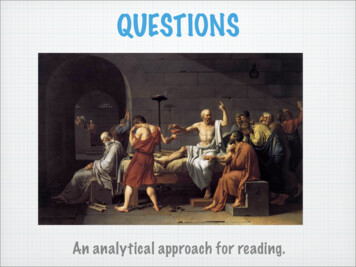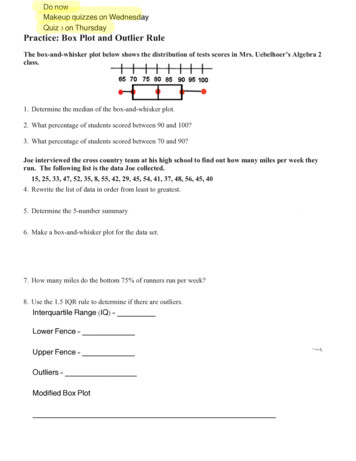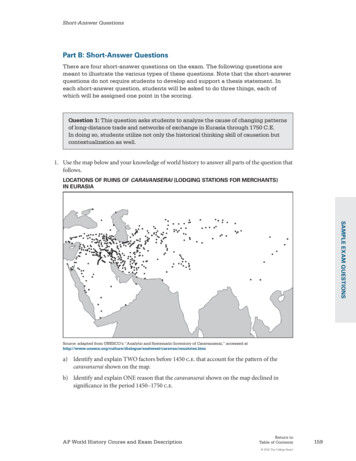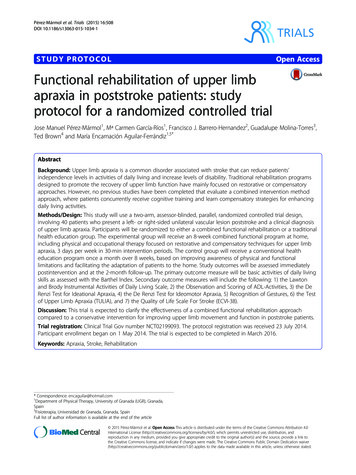
Transcription
QUESTIONSAn analytical approach for reading.
QUESTIONS“The unexaminedlife is not worthliving”An analytical approach for reading.
The Critical Mind is aQuestioning MindThe key to powerful thinking is powerful questioning.The key to purposeful reading is purposeful questioning.
THREE TYPES OF QUESTIONS:1. Factual2. Interpretive3. Evaluative
FACTUAL QUESTIONS
FACTUAL QUESTIONSEveryone will eventually agree onthe answer.
FACTUAL QUESTIONSEveryone will eventually agree onthe answer.Define words that are unclear.
FACTUAL QUESTIONSEveryone will eventually agree onthe answer.Define words that are unclear.Clarify factual elements of theplot.
INTERPRETIVE QUESTIONS
INTERPRETIVE QUESTIONSWhat is meant by what is said?
INTERPRETIVE QUESTIONSWhat is meant by what is said?Must be an honest question that requiresreturning to the text.
INTERPRETIVE QUESTIONSWhat is meant by what is said?Must be an honest question that requiresreturning to the text.Draws the reader into a deeper understanding ofthe work.
INTERPRETIVE QUESTIONSWhat is meant by what is said?Must be an honest question that requiresreturning to the text.Draws the reader into a deeper understanding ofthe work.Answers must be supported from the text.
INTERPRETIVE QUESTIONSWhat is meant by what is said?Must be an honest question that requiresreturning to the text.Draws the reader into a deeper understanding ofthe work.Answers must be supported from the text.After discussion, some questions mightremain unresolved.
Evaluative Questions
Evaluative QuestionsThis is the only type of question inwhich your personal opinion can bestated.
Evaluative QuestionsThis is the only type of question inwhich your personal opinion can bestated.In short, what do you think aboutsome idea or theme that is presentedin the work?
The Art of QuestioningWhat is the purpose? What is the goal? What is the agenda?What is the main problem? What is the crucial issue? What is thekey information? What conclusions can I reach? How can Iinterpret the information? What is really going on? Why should Icare? What assumptions am I making? What assumptions is theauthor or speaker making? What are the implications? What isthe author’s point of view? What is my point of view? Whatinformation is missing? What additional questions could I ask?
Purposeful Reading Understand your purpose in reading Understand the author’s purpose in writing Determine how ideas in a text are interconnected Look for and understand systems of meaning Engage in the text while reading - reading is anactive process! Move past impressionistic reading Formulate questions and seek answers to thosequestions while reading.
Effective Discussion Attentive listening. Incorporation of factual, interpretive, andevaluative questions. Equal, balanced participation. Questioning which extends thinking (Socratic). Comments to share ideas, to clarify the ideas ofothers, to extend thinking, to show support, and topresent multiple (different) perspectives. Comments that redirect discussion back toimportant or relevant topics. Comments and questions that address ideas, notpeople.
Fundamental QuestionsQuestions define tasks, express problems and delineate issues.Answers often signal a full stop in thinking.No questions equals no understanding. Most students typically haveno intellectual questions. They not only sit in silence, their mindsare silent as well.Intellectual fields of study are born of questions to which answersare needed. Every field stays alive only to the extent that freshquestions are generated and explored.Great advances in thought, in technology, in the arts, often arisefrom efforts to find answers to fundamental questions.
Great ThinkersWhen we consider the work of Einstein, Dar win, and Newton,we find, not the unfathomable, genius mind. Rather we findthinkers who placed deep and fundamental questions at theheart of their work and pursued them passionately.The search for answers to fundamental questionscan lead to new paradigms.
References:The Critical Mind is a Questioning Mindhttp://www.criticalthinking.orgThe Role of Socratic Questioning inThinking, teaching, and Learning http://www.criticalthinking.org.
Questions define tasks, express problems and delineate issues. Answers often signal a full stop in thinking. No questions equals no understanding. Most students typically have no intellectual questions. They not only sit in silence, their minds are silent as well. Intellectual fields of study are born of questions to which answers are needed.










